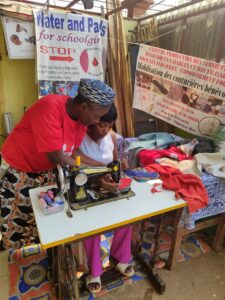A woman’s right to control her own body is a pre-condition for sustainable development
Without women’s contribution, it will be impossible to achieve sustainable development, which implies a three-pronged demand for social equity, economic efficiency, and environmental quality, and imposes respect for fundamental principles, including solidarity and participation by everyone in the collective effort.
The fact that women, who constitute half of humanity, are the object of discrimination and of sometimes extreme violence is one of the main obstacles to a sustainable development as defined above.
This is a question not only of justice, but also of efficiency, in that women have the primary responsibility for the care of children and, moreover, in many societies they play a major social role in managing natural resources such as water and energy, and in agriculture.
Consequently, it is essential to implement programmes to eliminate such discrimination and situations of violence so that women can become full economic players.
We cannot side-step the essentials
The complexity of the cultural, social, economic and legal implications of action programmes dealing with gender relations in society leads us to fear that future conferences on these subjects will merely produce a rash of proposals similar to those already put forth in the past. The risk is that they will overlook an essential requirement that precedes all the others: the immediate and unreserved recognition of a woman’s fundamental right to control her body.
As has already been stressed in a report to the United Nations Human Rights Council (Anand Grover, Special Rapporteur of the Human Rights Council on the right of everyone to the enjoyment of the highest attainable standard of physical and mental health, in accordance with Human Rights Council resolutions 15/22 and 6/29 —report presented to the United Nations General Assembly A/66/254: distributed on 3 August 2011/Sixty-sixth session), what is at issue here is a right to health, which States have a duty to respect:
“Realization of the right to health requires the removal of barriers that interfere with individual decision-making on health-related issues and with access to health services, education and information, in particular on health conditions that only affect women and girls. In cases where a barrier is created by a criminal law or other legal restriction, it is the obligation of the State to remove it. The removal of such laws and legal restrictions is not subject to resource constraints and can thus not be seen as requiring only progressive realization. Barriers arising from criminal laws and other laws and policies affecting sexual and reproductive health must therefore be immediately removed in order to ensure full enjoyment of the right to health.”
Rights and sustainable development go hand in hand
It is clear that women cannot become full economic players unless they are able to choose the number and the timing of the children they will bear.
Today the link between demographics and women’s education level is recognized in Europe, where the decline in demographic growth has been brought about by access to contraception and abortion, linked to the education level of girls. The reverse side of the coin is that when demographics are not controlled by the women concerned, this leads to the abandonment of studies.
When it comes to the environmental aspect, the latest UN projections of the world population place it at 10 billion human beings by the year 2050. While we know that the ecological footprint of a Bengali baby is much smaller than that of a French baby, there is no denying that demographic growth and population imbalances have a severe impact on the environment. Moreover, many international reports show that, in most developing countries, these imbalances associated with climatic disruption are exacerbating women’s poverty, their food insecurity, and the violence committed against them.
In conclusion, while recognition of women’s right to control their fertility, including through resort to abortion, seems essential in order to guarantee their autonomy throughout the world, this issue is in fact underestimated, marginalized and even excluded from the matters debated in many international meetings, under cultural, religious or geopolitical pretexts.
In the end, there can be no sustainable development without respect for the fundamental rights of individuals, starting with the right of women to exercise free control over their body.




